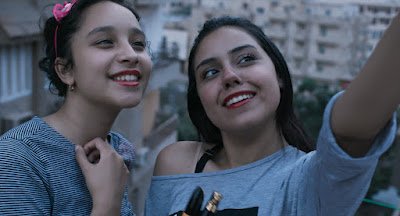The first image in the Egyptian writer-director Ayten Amin's second feature Souad is that of a female face on a mobile, a nervous self-regard. Notice is hereby served of Amin's intent to monitor the fragile self-image of a group of young Arab women - sisters, literal and figurative - living in the Nile Delta city of Zagazig. Time and again, Amin's heroines return to their screens: checking their Facebook photos, to see how many likes they've clocked up (and, more crucially, who's liked them); checking their contemporaries' photos, to see how they compare; checking their instant messages, to see if they've been read and/or responded to. You should see how antsy they get when a phone gets misplaced. This is the urbane, cosmopolitan end of the Middle East - some distance from the renewed terrors of the Taliban - but it's still besieged by doubts, worries and neuroses, as well as the old, patriarchal assumptions that women were made for marriage, to sweep floors and make tea. (There's only so much content to be gained from that.) Compiled some ten years after the Arab Spring, Amin's thesis is that social media has been revolutionary on many fronts, in several respects: these platforms have opened up new paths, new images and a new way for Egyptian women to look and think about themselves. Yet as with so many revolutionary movements, it's also brought on new waves of unhappiness. Political concerns have given way to more personal insecurities: we carry these ones around in our own back pockets.
The film's look is traditional arthouse-observational, DoP Maged Nader tracking the girls' progress with a varyingly wobbly handheld camera. Set against certain American features on the dangers posed by smartphones - Jason Reitman's 2014 dud Men, Women and Children, most infamously - Souad feels authentic, its virtual fretting grounded in mundane, everyday activity (bus journeys, trips to the market, household chores; a near-constant hum of traffic noise). So real is the action, in fact, that the film risks seeming underpowered dramatically. Throughout the first half, Amin's girls don't seem badly off - certainly not when compared (as it's hard not to) with the young Black protagonists of Céline Sciamma's Girlhood, who were far more marginalised, and found themselves pressured into uncomfortable, risky situations. (At risk of sounding like everybody's dad, these girls' troubles would surely dissipate if they just stepped away from the laptop.) Perhaps this is why Amin and co-writer Mahmoud Ezzat contrive a mid-film tragedy - literally while the camera's back is turned - in order to raise the stakes; from nurdling along, the movie suddenly veers towards an extreme. The second half - in which one of the girls sets out to confront the man she blames for the tragedy - returns to the earlier, quiet assurance, and benefits from a different dynamic: from an all-girl safe space, we're suddenly on unfamiliar streets with potentially dangerous company. There's a clearer tension here, but also a wisdom, applied towards finding solutions for the problems the first half diagnoses. (Notably: that men and women would get along better if they didn't interact through screens, if they escaped the tendrils of the social networks that have done so much to demonise the opposite sex.) It's another film entirely, and a worthwhile one - it's just a slight pity it should require such a lurching, melodramatic misstep to carry Souad there.
Souad opens in selected cinemas from today, ahead of a major BFI Southbank season devoted to Arab cinema that begins next week.

No comments:
Post a Comment